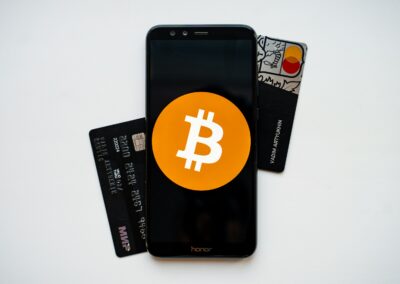Empowering Individuals to Control Their Digital Identities
The Role of Blockchain in Self-Sovereign Identity
Blockchain and self-sovereign identity provide a framework that empowers individuals to own, control, and share their digital identities without relying on central authorities. Blockchain technology plays a pivotal role in enabling self-sovereign identity (SSI), allowing individuals to control and manage their own digital identities securely and efficiently. In a world increasingly reliant on digital interactions, the concept of SSI is becoming essential for protecting personal data and ensuring privacy.
In regions like Saudi Arabia, the UAE, Riyadh, and Dubai, where technological innovation is rapidly transforming business and government services, the implementation of blockchain for SSI is particularly relevant. These regions are committed to leading in digital transformation, and blockchain-based SSI systems align perfectly with their vision of secure and user-centric digital services. By adopting blockchain technology, they can enhance data privacy, reduce identity theft, and streamline verification processes.
Moreover, the rise of technologies such as Artificial Intelligence (AI) and The Metaverse further underscores the need for robust digital identity solutions. SSI, enabled by blockchain, ensures that individuals can securely navigate these digital spaces, maintaining control over their personal information. This approach not only enhances security but also fosters trust in digital interactions, which is crucial for the widespread adoption of new technologies.
Key Components of Self-Sovereign Identity
Self-sovereign identity systems built on blockchain technology consist of several key components that collectively ensure the security and integrity of digital identities. Firstly, these systems utilize decentralized identifiers (DIDs) that are created, owned, and managed by individuals. Unlike traditional identifiers, which are issued and controlled by central authorities, DIDs are independent and provide users with full control over their identity data.
Secondly, SSI systems incorporate verifiable credentials, which are digital attestations issued by trusted entities. These credentials can include a wide range of information, such as educational qualifications, professional certifications, and personal attributes. By using blockchain to store and verify these credentials, individuals can easily prove their identity and qualifications in a secure and tamper-proof manner. In advanced digital environments like Riyadh and Dubai, this capability is crucial for enhancing the efficiency and security of various services.
Thirdly, blockchain-based SSI systems include secure and transparent data-sharing mechanisms. Individuals can selectively disclose specific attributes of their identity to third parties without exposing their entire identity. This granular control over data sharing enhances privacy and minimizes the risk of identity theft. By implementing these components, organizations in Saudi Arabia and the UAE can provide secure and user-friendly identity management solutions that align with global standards.
Implementing Self-Sovereign Identity: Best Practices
Implementing self-sovereign identity systems effectively requires a strategic approach that involves collaboration between various stakeholders, including governments, businesses, and technology providers. Leadership plays a crucial role in driving the adoption of SSI and ensuring that it is integrated into the broader digital ecosystem. Executive coaching services can support leaders in understanding the importance of SSI and guiding their teams in implementing best practices.
One best practice is to establish a regulatory framework that supports the adoption of SSI. Governments in Saudi Arabia and the UAE can develop policies and guidelines that encourage the use of blockchain for identity management while ensuring compliance with data protection laws. This regulatory support can provide a clear roadmap for organizations and foster a conducive environment for the adoption of SSI.
Another best practice is to invest in education and awareness programs. By educating individuals about the benefits of SSI and how to use these systems, organizations can enhance user adoption and engagement. In dynamic business environments like those in Dubai and Riyadh, continuous learning and adaptation are essential for staying ahead of technological changes. These programs can also address potential concerns and misconceptions about blockchain and SSI, building trust and confidence among users.
Case Studies: Blockchain and Self-Sovereign Identity in Action
Several initiatives in Saudi Arabia and the UAE illustrate the successful implementation of blockchain for self-sovereign identity. For instance, the UAE’s National Blockchain Strategy aims to leverage blockchain technology to enhance government services and improve data security. As part of this strategy, the government has developed SSI solutions that enable citizens to access and manage their digital identities securely. These solutions include verifiable credentials for various services, such as healthcare and education, providing a seamless and secure user experience.
In Saudi Arabia, the adoption of blockchain for identity management is evident in the financial sector. Major banks and financial institutions have implemented blockchain-based SSI systems to enhance the security of customer data and streamline identity verification processes. By using blockchain to store and verify identity credentials, these institutions can reduce fraud, improve compliance with regulatory requirements, and enhance customer trust.
Another notable example is the use of SSI in the education sector in Dubai. Educational institutions have adopted blockchain-based systems to issue and verify digital diplomas and certificates. These verifiable credentials enable graduates to easily prove their qualifications to employers and other institutions, enhancing transparency and reducing the risk of credential fraud. By adopting these systems, Dubai is setting a benchmark for secure and efficient identity management in the education sector.
The Future of Self-Sovereign Identity
The future of self-sovereign identity will be shaped by ongoing technological advancements and evolving regulatory landscapes. As AI, The Metaverse, and other digital technologies continue to develop, the need for secure and user-centric identity solutions will become increasingly important. Blockchain-based SSI systems are well-positioned to meet this need, providing a robust framework for managing digital identities in a secure and decentralized manner.
One emerging trend is the integration of SSI with AI-driven analytics and decision-making tools. By combining blockchain-based identity management with AI, organizations can enhance the security and efficiency of their operations. For example, AI can be used to analyze identity data and detect anomalies or potential security threats in real-time. This proactive approach to identity security helps organizations respond quickly to risks and protect digital identities effectively.
Another trend is the adoption of SSI in The Metaverse. As virtual environments become more prevalent, the need for secure and interoperable identity solutions will grow. Blockchain-based SSI systems can provide individuals with a consistent and secure identity across various digital platforms, enhancing the user experience and ensuring data privacy. In regions like Riyadh and Dubai, where digital innovation is a priority, staying ahead of these trends is essential for maintaining leadership in the digital economy.
Conclusion: Embracing Blockchain for Secure Digital Identities
Blockchain technology is essential for enabling self-sovereign identity and empowering individuals to control and manage their own digital identities. By implementing robust SSI systems, organizations in Saudi Arabia, the UAE, Riyadh, and Dubai can enhance data privacy, reduce identity theft, and streamline verification processes. These systems align with global standards and support the regions’ vision of secure and user-centric digital services.
The future of self-sovereign identity will be shaped by ongoing technological innovation and evolving regulatory landscapes. Organizations must remain vigilant and adaptable, continuously improving their identity management practices to address new challenges and opportunities. By prioritizing identity security and embedding ethical considerations into their operations, businesses can drive success and contribute to a secure and trustworthy digital environment.
In conclusion, blockchain and self-sovereign identity are not just technological advancements but strategic assets that enhance business reputation, foster customer trust, and support sustainable growth. By embracing best practices and leveraging advanced technologies, organizations can ensure that digital identities are protected and ethical standards are upheld in the digital age.
—
#Blockchain, #SelfSovereignIdentity, #DigitalIdentities, #PersonalDataControl, #SaudiArabia, #UAE, #Riyadh, #Dubai, #ArtificialIntelligence, #Metaverse, #ExecutiveCoaching, #GenerativeAI, #ModernTechnology, #BusinessSuccess, #Leadership, #ManagementSkills, #ProjectManagement































